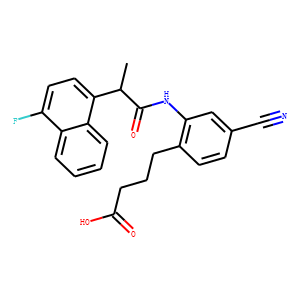| InChI | InChI=1S/C24H21FN2O3/c1-15(18-11-12-21(25)20-7-3-2-6-19(18)20)24(30)27-22-13-16(14-26)9-10-17(22)5-4-8-23(28)29/h2-3,6-7,9-13,15H,4-5,8H2,1H3,(H,27,30)(H,28,29) |
| Reference | 1. Cell Biochem Biophys. 2014 Sep;70(1):521-7. doi: 10.1007/s12013-014-9951-2.
<br>
An EP4 antagonist ONO-AE3-208 suppresses cell invasion, migration, and metastasis
of prostate cancer.
<br>
Xu S(1), Zhang Z, Ogawa O, Yoshikawa T, Sakamoto H, Shibasaki N, Goto T, Wang L,
Terada N.
<br>
Author information: <br>
(1)Department of Urology, Jinling Hospital, Clinical School of Nanjing, Second
Military Medical University, Nanjing, China.
<br>
EP4 is one of the prostaglandin E2 receptors, which is the most common prostanoid
and is associated with inflammatory disease and cancer. We previously reported
that over-expression of EP4 was one of the mechanisms responsible for progression
to castration-resistant prostate cancer, and an EP4 antagonist ONO-AE3-208 in
vivo suppressed the castration-resistant progression regulating the activation of
androgen receptor. The aim of this study was to analyze the association of EP4
with prostate cancer metastasis and the efficacy of ONO-AE3-208 for suppressing
the metastasis. The expression levels of EP4 mRNA were evaluated in prostate
cancer cell lines, LNCaP, and PC3. EP4 over-expressing LNCaP was established, and
their cell invasiveness was compared with the control LNCaP (LNCaP/mock). The in
vitro cell proliferation, invasion, and migration of these cells were examined
under different concentrations of ONO-AE3-208. An in vivo bone metastatic mouse
model was constructed by inoculating luciferase expressing PC3 cells into left
ventricle of nude mice. Their bone metastasis was observed by bioluminescent
imaging with or without ONO-AE3-208 administration. The EP4 mRNA expression
levels were higher in PC3 than in LNCaP, and EP4 over-expression of LNCaP cells
enhanced their cell invasiveness. The in vitro cell invasion and migration were
suppressed by ONO-AE3-208 in a dose-dependent manner without affecting cell
proliferation. The in vivo bone metastasis of PC3 was also suppressed by
ONO-AE3-208 treatment. EP4 expression levels were correlated with prostate cancer
cell invasiveness and EP4 specific antagonist ONO-AE3-208 suppressed cell
invasion, migration, and bone metastasis, indicating that it is a potential novel
therapeutic modality for the treatment of metastatic prostate cancer.
<br>
2. Zhonghua Nan Ke Xue. 2014 Aug;20(8):684-9.
<br>
[Inhibitory effect of ONO-AE3-208 on the formation of bone metastasis of prostate
cancer in mice].
<br>
[Article in Chinese]
<br>
Xu S, Ge JP, Zhou WQ, Zhang ZY.
<br>
OBJECTIVE: To examine the effect of ONO-AE3-208, an EP4 antagonist, on the
formation of bone metastasis from prostate cancer in mice.
METHODS: Thirty-four 6-week old nude mice were divided into an experimental and a
control group of equal number to be treated by intraperitoneal injection of
ONO-AE3-208 and double distilled water, respectively. Then PC3/LUC cells were
constructed by stably transfecting luciferin to prostate cancer PC3 cells and
inoculated into the left ventricle of the mice to establish an animal model of
systemic bone metastasis. The time of metastasis formation, photon tumor burdens,
and changes of the survival curves after modeling were compared between the two
groups of mice.<br>
RESULTS: At 30 days after modeling, bioluminescence imaging analysis showed that
the photon tumor burdens were significantly increased in a time-dependent manner
in the control group in comparison with those in the experimental group (P <
0.01). The rate of metastasis formation was significantly higher in the former
than in the latter (93.3% vs 33.3%, P < 0.001). The median time of metastasis
formation was 29 d (95% CI 26.547 – 35.262) in the experimental animals as
compared with 21 d (95% CI 17.213 -24.787) in the controls (P < 0.001).
CONCLUSION: EP4 antagonist ONO-AE3-208 can inhibit the formation of bone
metastasis from prostate cancer in mice.
<br>
|

